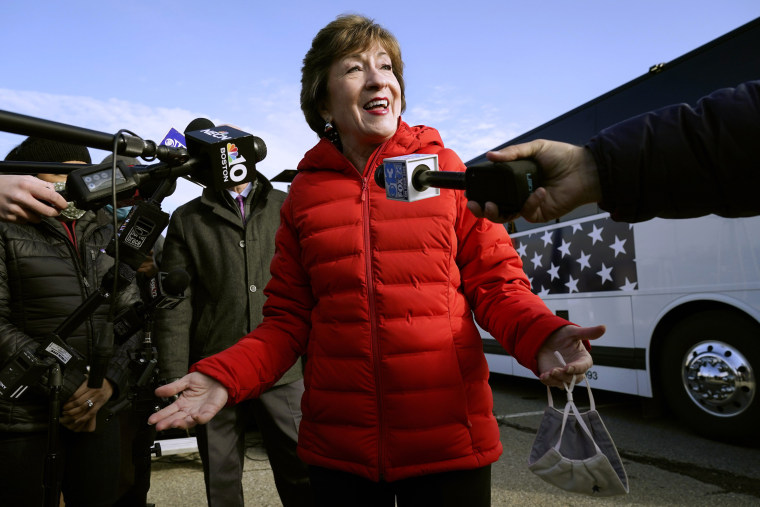From the start of 2020, Democrats saw three Senate Republican incumbents as especially vulnerable: Arizona's Martha McSally, Colorado's Cory Gardner, and Maine's Susan Collins. For months, it seemed each of these three would have a very tough time holding onto their seats, boosting Democratic prospects of reclaiming a majority.
And yet, here we are.
Democrat Sara Gideon has conceded the Maine Senate race to incumbent Republican Sen. Susan Collins, a top target of Democrats this election cycle. "We came up short," Gideon told supporters on Wednesday afternoon. She said she'd called Collins to wish her well. "I congratulated her on winning this election and told her I'll always be available to help serve the people of Maine," Gideon said.
For the record, NBC News, at least as of this minute, hasn't yet made a projection in the race, though once a candidate concedes, and announces to the public that she's come up short, it's probably fair to say the outcome is clear.
There are 33 members of Congress from New England, combining U.S. House and U.S. Senate seats. Barring any dramatic changes, only one of the 33 -- Susan Collins -- will be a Republican.
I tend to shy away from publishing predictions, but I'll concede that I expected Gideon to win. The Democrat raised a ton of money; she had a record of success in Maine; she led in literally every public poll released in the months leading up to Election Day; and the state's unique ranked-choice system appeared to be another disadvantage for the incumbent.
But Collins appears to have come out on top anyway. For the Maine Republican, that's obviously cause for celebration for her personal interests -- she gets to keep her job -- but the senator has another reason to be delighted right now. Though the outcome of several important elections remains unclear, it's possible we'll see a Senate next year led by a narrow GOP majority, working alongside a Democratic-led House.
That, in turn, would put Collins -- who isn't as far to the right as her Senate Republican colleagues -- in a potentially influential position on many key votes.
As for partisan control of the Senate, by NBC News' tally, Democrats currently have 46 seats headed into the next Congress. That number may climb to 47 if Mark Kelly prevails in his Arizona race against Republican incumbent Sen. Martha McSally. (While several news organizations have already declared Kelly the winner, and the former astronaut delivered a victory speech overnight, NBC News has not yet called the race.)
That leaves us with a handful of races that also haven't yet been called. Following up on this morning's post, here's the list in alphabetical order:
Alaska: Incumbent Sen. Dan Sullivan (R) is generally seen as the favorite over Al Gross -- an independent who accepted the Democratic nomination -- but only about half of the votes have been counted.
Georgia: With votes yet to be tallied, incumbent Sen. David Perdue (R) is narrowly leading Jon Ossoff (D), though a runoff is still possible if neither candidate reaches 50%. In Georgia's Senate special election, Raphael Warnock (D) was the top vote-getter in the large field, and he'll take on appointed incumbent Sen. Kelly Loeffler (R) in a January runoff.
Michigan: Incumbent Sen. Gary Peters (D) still appears to be slightly trailing John James (R), though as we're seeing in the presidential race, there are plenty of outstanding Michigan ballots, including from Democratic areas, still being counted.
North Carolina: Incumbent Thom Tillis (R) currently has a slight edge over Cal Cunningham (D), but it's among the too-close-to-call races.
If the Democratic candidates can end up winning three of five races -- plus the Arizona contest -- and if Joe Biden prevails, then there'd be a 50-50 Senate with Dems in nominal control. But given what we know, it seems the odds are that Mitch McConnell (R) will remain the Senate majority leader next year.

